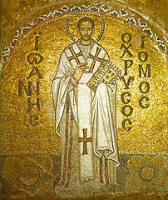
Life Of John Chrysostom by Frederic M. Perthes
XVII
THE ADHERENTS OF CHRYSOSTOM IN CONSTANTINOPLE
BEFORE we follow the bishop in his exile, we will take a retrospective glance at the capital and the events which there transpired after his removal.
Scarcely had Chrysostom left his church, when a fire broke out in the same, which in a few hours laid it with the neighboring palaces in ashes. His enemies naturally accused his followers, and even himself, of setting the fire. Optatus, the prefect of the city, appointed a trial and called in a large number of men and women, the friends of the bishop, and sought by means of the most cruel tortures to extort a confession from them. Several individuals, and among others, the reader Eutropius, a young ecclesiastic, died under the torture. Olympias, the distinguished friend of Chrysostom, was herself brought before the court. The prefect without further ceremony asked her why she had set fire to the church? She answered, “The life I have led before you ought, I think, to protect me from such a charge. I have built many churches, how then could I set one on fire?” Optatus then, in allusion to the rumors previously mentioned, scornfully replied: “Yes, we very well know what kind of life you have led.” “Then,” said Olympias, “let another be judge, and do you become my accuser.”
This investigation continued two months, yet it led to no results, since the author of the conflagration was never discovered. Even had the fire originated with one of Chrysostom’s many adherents, yet his true friends would not of course be knowing to the fact. Finally the Emperor brought the investigation to an end, and released the accused from their imprisonment.
But this, to the friends of the exile, was not the end of persecution. A new bishop was speedily appointed in his place and the person chosen for this was Arsacius, who for a long time had served as archdeacon with Chrysostom, but afterwards appeared as witness against him in the council at Chalcedon. He lived but seventeen months and was then succeeded by Atticus, who also took part with him at the same council. The friends of Chrysostom felt that they could have no communion with such men and hence assembled for their worship, which was conducted by the friendly clergy, outside of the city, beneath the open sky. A command was then issued for the dispersion of these “Johannites,” as they were called, which was effected with the aid of clubs and stones. All such assemblages from that time were prohibited. A similar course was pursued abroad. Several of the Asiatic clergy who would not continue in church fellowship with the bishops of Canstantinople and Alexandria, were threatened with removal from their office, and with the confiscation of their property. Some who remained steadfast, as Serapion of Heraclea, were sent into exile. Heraclides of Ephesus was detained four years in prison. At Antioch there died just at this time the old friend of Chrysostom, the bishop Flavian. In his place was ordained, by the hands of Severian and his companions, though in a violent manner and in opposition to the plainly declared will of the church, a certain Porphyrius, who, on account of his dissolute life in connection with play actors and singers, was universally despised. In consequence of these things the same disorder prevailed in this church as in Constantinople.
Innocent, the bishop of Rome and one of the most distinguished of his times, who of course knew something of this matter and had also received a letter from Chrysostom himself, was anxious to be heard in the case. But the messengers sent by him were detained on the sea, and when they could not be bribed by the money which was offered them, their papers were taken from them, and they themselves, scattered in different directions, were sent home.
The writers also of that time have not failed to mark the traces of that retributive justice which rules over the earth. The Empress Eudoxia died in the same autumn, the sixth of October, in the pains of childbirth. Quirinus, the bishop of Chalcedon, who during the synod was laid aside through an injury received in his foot, died soon after this, having had both of his legs amputated. Another of the unjust judges lost his reason, and imagined himself to be continually pursued by wild beasts. The tongue of a third “with which he pronounced the sentence,” became swollen to such a degree that he never again could speak, but wrote on a tablet a confession of his guilt. Still another suffered intolerably from the gout in the finger “with which he wrote the sentence,” etc. Who of us will blame the people of that time for being reminded by such occurrences, of the words of Scripture: God is not mocked.
Copyright ©1999-2023 Wildfire Fellowship, Inc all rights reserved

 Keep Site Running
Keep Site Running